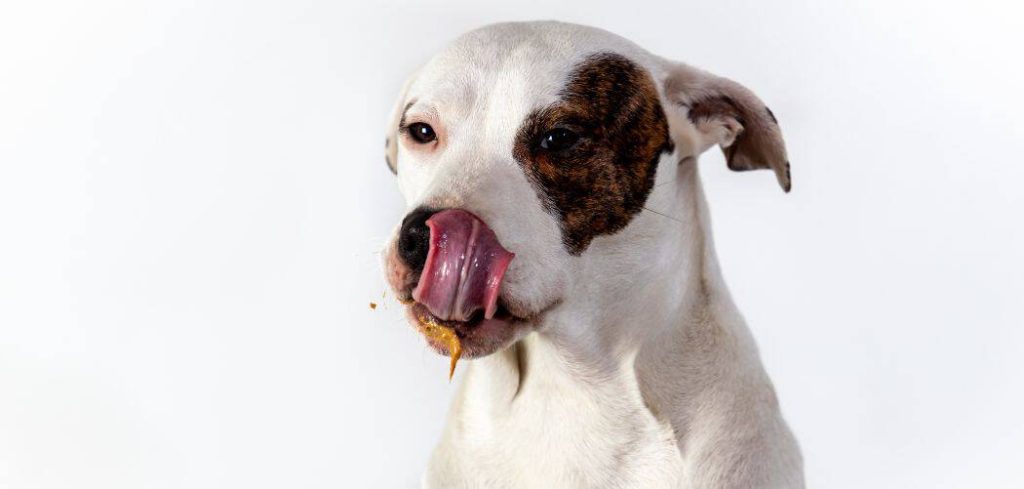Panting and licking the air can be a confusing behavior for dog owners. While some dogs do it playfully or out of curiosity, persistent air licking and heavy panting can indicate stress or other health problems.
We outline the common reasons why dogs may pant and lick the air, what you can do, and when to seek veterinary help.
Dog Panting and Licking Air — Why It Happens
Panting paired with air licking usually points to nausea, gastrointestinal discomfort, or dental pain. Dogs may also lick the air if something is stuck in their mouth or throat, or if they’re experiencing neurological issues like seizures.

Dog Panting and Licking Air: Common Causes
Nausea or Upset Stomach
Air licking often accompanies nausea or gastrointestinal discomfort. Dogs may pant and lick the air as a way to cope with queasiness.
Signs include drooling, vomiting, retching, or a decrease in appetite. This behavior can indicate digestive upset, eating something unusual, or even an early sign of illness.
Read more: Dog Panting and Licking Floor (Why dogs do it and what it means)
Anxiety or Stress
Panting and air licking can be a stress response. Dogs may exhibit these behaviors when anxious or overstimulated.
Triggers include separation anxiety, loud noises, new environments, or changes in routine. Other signs may include pacing, whining, hiding, or trembling.
Oral or Dental Issues
Dental discomfort can lead to panting and licking air. Dogs with oral pain may lick at nothing as a way to soothe irritation in their mouth.
Signs include bad breath, difficulty eating, pawing at the mouth, or drooling. Dental disease can worsen if left untreated and may contribute to other health problems.
Compulsive or Behavioral Disorders
Some dogs develop compulsive licking behaviors. This may involve licking air, objects, or even themselves repetitively.
Panting often accompanies compulsive behaviors due to stress or overstimulation. Compulsive licking can be exacerbated by boredom, anxiety, or neurological issues.
Gastrointestinal Disorders
Conditions affecting the stomach or intestines can prompt air licking. Dogs may try to alleviate nausea or discomfort by licking the air.
Signs may include vomiting, diarrhea, changes in appetite, or lethargy. Chronic gastrointestinal issues require veterinary assessment for proper treatment.
Attention-Seeking or Learned Behavior
Dogs sometimes lick air as a way to get attention. If a dog notices that air licking elicits a reaction from their owner, the behavior may be reinforced.
Panting can accompany excitement or anticipation. Redirecting attention with toys or training can help reduce this behavior over time.
Read more: Dog Panting and Licking a Lot (Understanding the causes)
What to Do If Your Dog Is Panting and Licking Air
Observe the frequency and context of the behavior. Understanding when your dog licks the air can help identify the underlying cause.
Provide enrichment and mental stimulation through walks, games, or puzzle toys. Reducing boredom or stress can help prevent compulsive air licking.
Ensure your dog has access to fresh water and a balanced diet. Addressing hunger, thirst, or minor digestive upset can reduce air licking prompted by nausea.
Monitor for signs of dental problems or oral discomfort. Regular teeth brushing and veterinary check-ups help prevent oral disease.
If panting and air licking persist or worsen, consult your veterinarian. They can rule out medical issues and offer behavioral strategies to manage the behavior safely.
When to Call or Visit Your Vet
Seek immediate veterinary attention if your dog exhibits:
Persistent, excessive panting and air licking
Vomiting, diarrhea, or refusal to eat
Signs of oral pain or swelling
Lethargy, disorientation, or collapse
Behavioral changes or compulsive licking that intensifies
Prompt attention can prevent complications and ensure your dog’s comfort and health.
Read more: Dog panting excessively (Here’s Why)
Key Takeaway
Panting and licking air is often a sign that your dog is experiencing nausea, stress, dental discomfort, or a behavioral issue.
Careful observation, providing a safe and stimulating environment, and seeking veterinary guidance when necessary are essential steps. By addressing these behaviors early, you can ensure your dog remains healthy, comfortable, and happy.
